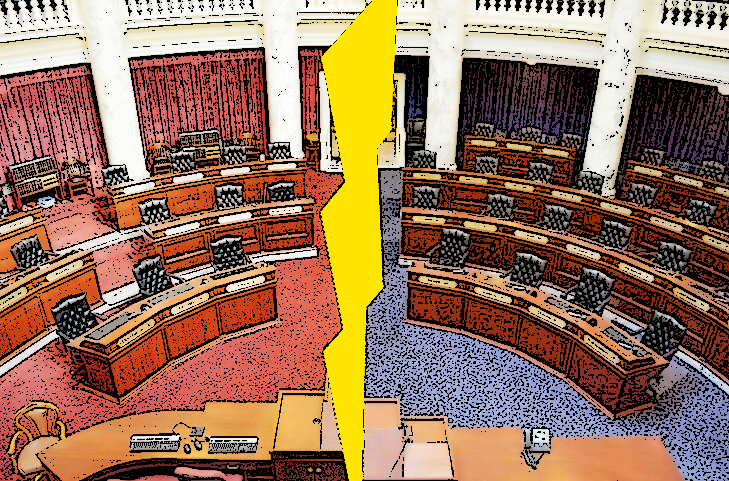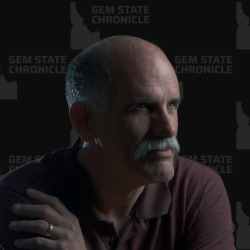Shortly after Donald Trump took office as the 45th President of the United States, an anonymous user on Reddit created a silly gif of Trump punching a CNN logo in the face. It represented the way in which Trump was doing battle with what he called the “fake news” media. It was funny.

CNN didn’t find it funny. The network sicced investigative reporter Andrew Kaczynski on the case, who published an article saying he knew the name and personal information of the anonymous user and had essentially forced him to apologize:
CNN is not publishing “HanA**holeSolo’s” name because he is a private citizen who has issued an extensive statement of apology, showed his remorse by saying he has taken down all his offending posts, and because he said he is not going to repeat this ugly behavior on social media again. In addition, he said his statement could serve as an example to others not to do the same.
The popular conception of journalism is that of brave reporters doggedly searching for the truth, no matter the risks, no matter the powerful interests that might oppose them. The hagiography of journalism as a profession, as exhibited in films such as All the President’s Men, teaches Americans that journalists are bona fide heroes.
Yet reporters like Andrew Kaczynski are all too common today. Rather than using his time and energy to go after the powerful, he went after a private citizen for a silly video. Consider also the case of Chaya Raichik, who operated the anonymous Twitter account LibsOfTikTok which simply reposted videos which were already publicly published by leftists. Taylor Lorenz, then working for the Washington Post, tracked down Raichik and published her name and information.
This practice, known as “doxxing,” has become a tool in the arsenal of left wing journalists who aim to stifle free speech or stop the exposure of leftist goals. Invasive journalism of the sort that was once reserved for the powerful is now deployed against private citizens whose only crime was publicly speaking their minds. Many journalists seem to act as the enforcement arm of the government or of one political party rather than independent watchdogs of government.
I recognize that I’m no longer merely a private citizen. I post my thoughts on this platform nearly every day, and I’ve put myself out there as a political commentator, a Republican officer, and a trustee of the Eagle Library Board. When Brian Holmes snarks about me on KTVB, I don’t mind. In fact, I am energized by the knowledge that I’m taking flak because I’m over the target. Bring it on!
Truly private citizens are a different matter. When journalists target people who have not stood for elected office, who sit on no public boards or commissions, who have done nothing but speak their minds, one must ask what is the purpose. Is it to impose a chilling effect on free speech, to make examples out of those who would criticize the liberal order?
All of that came to mind today as I received yet another question from a local journalist about the decision of the Eagle Library Board of Trustees to relocate about two dozen books from the teen section to the adult section at our September meeting. I’ve fielded questions about the decision from four or five different news outlets in the past six weeks, and many of those were probing questions to discover which citizens filed requests for relocation.
Under the new law established by House Bill 710 this year, guardians of minors who are able to access obscene materials in public schools or libraries can request that the library move such materials. If the library declines, then the person who filed the request has the option of suing the library for injunctive relief, $250 in fines, and potentially additional damages as well.
Even before H710, however, Eagle Library had a request for relocation form available to the public. Any citizen could fill out the form and request that a book be moved to a different shelf or even removed from the shelves entirely. Library staff and the library board have discretion regarding placement of materials. If something is inappropriate for children, then it should be on the adult shelves. If something is obscene, it shouldn’t be on any shelf. The Board welcomes community input in the process of selecting and categorizing materials.
In our September meeting, the Eagle Library Board considered several relocation requests. We ultimately decided to move 20 books from the teen shelves to the adult shelves, while moving 3 more behind the counter, leaving a placeholder on the shelf for anyone who wants to check it out. (This is similar to how DVDs and video games are often shelved.)
Naturally, local news outlets were curious and began asking questions about how we came to our decision. Much of our deliberation was in executive session, which is allowed by Idaho law in cases of potential litigation. Since H710 grants citizens a civil action if the board does not comply with a relocation request, the city attorney suggested we discuss the matter in private. As I’ve said, we are figuring this out as we go along; I don’t know if we will use executive sessions for relocation requests in the future.
In any case, several news outlets filed public records requests with the City of Eagle for as much information as they could find, but the City decided to redact the names of the citizens who filed relocation requests. I was not involved in that decision so I can only speculate as to why they did that, but I suspect it is to protect the privacy and safety of those citizens. This has become an extremely hot-button issue in Idaho, and people who have spoken up about inappropriate or obscene materials in libraries have found themselves targets of harassment and even threats.
For whatever reason, local journalists have been moving heaven and earth to figure out who these citizens are who dared file relocation requests. This morning I received an email from Ryan Suppe of Idaho Education News who said he was planning to name one of those citizens in a story later today. He asked me several questions, which I’ve pasted below with personally identifying information redacted:
I am planning to report today that [redacted] filed the written notices prompting the Eagle library board to relocate 23 books last month.
[Information about the citizen’s business and personal relationships.]
What is your relationship to [redacted], both personally and as chairman of the District 14 committee?
Did this relationship influence your decision to support relocating the books that [redacted] challenged? And did you consider disclosing this connection to the public prior to considering the requests?
Did the library board confirm whether [redacted] has minor children who were exposed to these books? Idaho code 18-1517B gives minors or their parents/guardians standing to file a lawsuit after filing a written notice.
What role, if any, did you play in the city’s decision to shield [redacted]’s identity in public records related to the written notices?
Would you support improving the transparency around book challenges filed with the Eagle Public Library moving forward?
Here are my responses, again with personal information redacted:
As you know, I can’t speak to anything that was discussed during the executive session at our September meeting.
[Answers regarding personal information about the citizen in question.]
My acquaintance or non-acquaintance with anyone who potentially submitted relocation requests did not influence my vote in the September meeting. The Eagle Library Board has discretion to relocate books within the library, and I believe all trustees took each book under consideration on its own merits.
I played no part in the decision by the City to redact the identities of those who submitted relocation requests.
On that note, however, perhaps you can explain why journalists have been spending time and resources trying to figure out who submitted relocation requests. Is this meant to be a chilling effect on citizen participation, a warning that anyone who requests that public library materials be relocated will have their name and information published? In this environment of heightened passions over this controversial issue, do you worry that you could be responsible for inciting harassment of private citizens?
Suppe has been pursuing this beat for a while — his previous article on the subject last week complained about the City not revealing the names of anyone who filled out relocation requests. As of this writing he has not responded to my questions, nor has he published his article naming the citizen in question. I expect to see it later today.
It’s time for journalists to decide if their job is to hold the powerful accountable on behalf of the people, or hold the people accountable on behalf of the powerful.
Gem State Chronicle is a reader-supported publication. To receive new posts and support my work, consider becoming a free or paid subscriber.
About Brian Almon
Brian Almon is the Editor of the Gem State Chronicle. He also serves as Chairman of the District 14 Republican Party and is a trustee of the Eagle Public Library Board. He lives with his wife and five children in Eagle.












